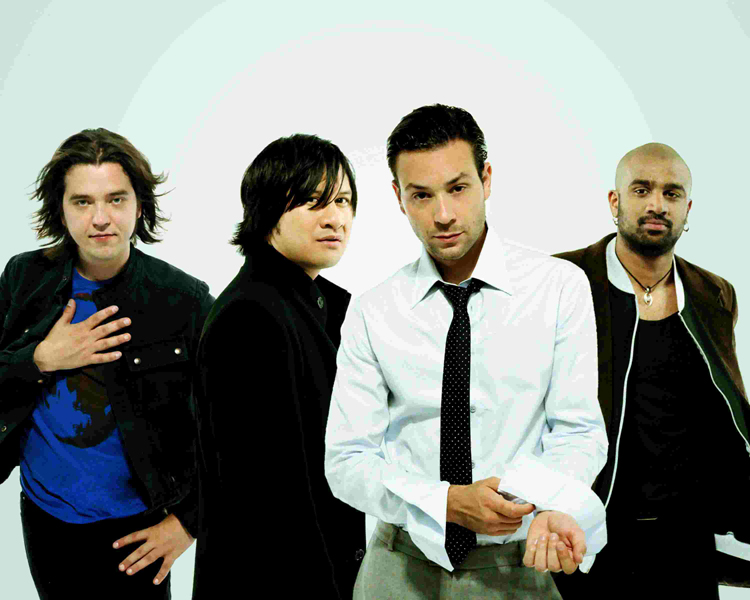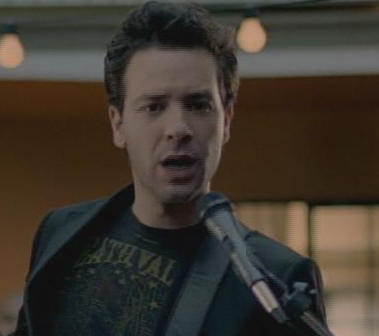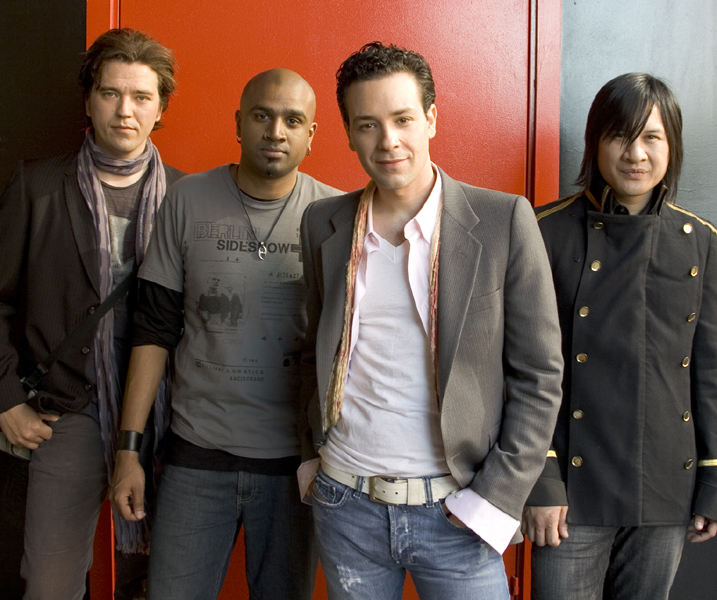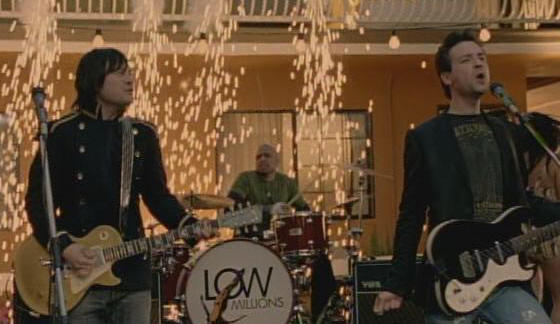

PopEntertainment.com
>
Feature
Interviews - Music >
Feature Interviews K to O >
Low Millions
 LOW
MILLIONS
LOW
MILLIONS
EX-FILES
BY JAY S.
JACOBS
Copyright ©
2005 PopEntertainment.com. All rights reserved.
Posted: May 29, 2005.
It's
never easy to make your own way when your father is a legend in your chosen
pursuit. Just ask Julian Lennon, Jakob Dylan and so many others, even
if you sound nothing like them, the comparisons will still come.
Adam
Cohen is in an even weirder position than most. His father is the
legendary novelist-turned-song-poet Leonard Cohen, who is revered by
critics, but has always been more of a cult artist than a popular one.
So the sales assessments may not be overwhelming, but artistically he has to
be at the top of his game to rate.
After
Cohen's 1998 self-titled debut album disappeared quickly, Cohen decided to
split his career in two distinct directions. He released a
French-language album called Melancolista in 2004. Cohen has
also formed a band called Low Millions with some long-time friends --
guitarist Michael Chaves, bassist Jorgen Carlsson and drummer Eric Eldenus.
The band has released their debut album Ex-Girlfriends.
The debut single "Eleanor" received a good amount of airplay. As the
second single, "Statue" was about to be released, Cohen sat down with us to
talk about his life, his career, and, yes, his dad.
Your father is a rather legendary figure in music. Did he help to inspire
you to take up music as a calling?
I
think I have some kind of genetic encoding and I think I was the beneficiary
of a very creative environment when I was growing up. I certainly had his
encouragement. So if you combine all those three factors, the answer is a
definitive yes. I had lots of help from my father.
Do
you ever feel intimidated by the inevitable comparisons that come?
I
think all great work is intimidating, much less when itís someone that
youíre related to. So, when itís the work of someone youíre related to,
sure.
You released your first solo album in 1998, and it was released to critical
acclaim, but didnít really find its audience.
(laughs)
Thatís a very polite way of putting it.
How disappointed were you that it didnít really catch on?
It
makes no real difference to me at this stage of the game. Whether or not it
had been successful would likely not have effected what Iíve done now. I
was lucky enough to find like-minded, talented musicians to form a band with
me. Thatís a luxury at any stage of your life.
I
had heard that you also have done some songwriting for Bette Midler, k.d.
lang and Mandy Moore. What did they record of yours?
You
know, Bette Midler is the only one that actually recorded it. That was
written (in an old article) and itís one of those things where someone wrote
that and put it out of context, and since then people have been quoting that
particular phrase. Iíve actually written for many, many more people who are
far more well-known. Some songs have been recorded. Some songs havenít.
Many songs I think were demoed. And then some songs were completely
ignored. (laughs) Itís really of no importance unless theyíve
recorded it, so Iíd rather not talk about it.
 Sure, well who were some of the ones that did get recorded?
Sure, well who were some of the ones that did get recorded?
Bette
Midler was definitely one of them. (The song that she recorded was called
ďLullaby in BlueĒ on her 1998 Bathhouse Betty
album.) Then there are a couple of French artists, one in Quebec and
one in France. There is a calypso artist
in Guadalupe. None of whom anybody would know, so itís not really
worth talking about. Bette Midler is the only international star who
has recorded anything of mine.
I
heard that you grew up in France? Where was that?
I
grew up in Paris and the south of France.
Last
year you released an album almost completely in French. What was it like to
be singing in your second language? I know you lived there, so you must
know the language well.
Sure,
plus Iím French Canadian. Iíve always been bilingual. I spent a total of
twelve years in France.
Making a record in French was like a culmination of wishes and work and time
invested in the language. It was a way of categorizing two projects. One
was going to be assignedÖ Adam Cohen was now going to be a dedicated French
recording artist. Adam Cohen was also then going to be the lead singer in a
band called Low Millions in English. There was a natural division that was
created by virtue of the other project. Itís also a way of dispensing a
certain category of song to one project versus the other. The more
cinematic, luscious, sexy work goes to the French stuff automatically, just
because it fits it better. The more immediate, commercial, explosive and
dynamic material gets assigned to Low Millions.
I
did notice that ďHey JaneĒ was also on the French album as well as the Low
Millions album. Was that the same recording, or did you do it differently?
I
actuallyÖ Iíd written that in French first and wanted to just make some kind
of pipeline between the two.
How did Low Millions come about?
Iíve
known them for years. Weíve been making music with each other on and off.
Weíd met in rehearsal halls and venues and through mutual friends. At
recording studios. All in Los Angeles. Theyíve been part of my recording,
rehearsing and gigging outfit for years in various combinations.
 Your
album is titled
Ex-Girlfriends and there are song titles that refer to specific womenís
names, like Eleanor, Julia, Jane and Nikki. Are those based on real exes?
Did you ever hear what they think about the songs?
Your
album is titled
Ex-Girlfriends and there are song titles that refer to specific womenís
names, like Eleanor, Julia, Jane and Nikki. Are those based on real exes?
Did you ever hear what they think about the songs?
Absolutely, yeah. Part of the treat and intrigue of this record was
that we got to speak about our own real relationships with people. We
got
to invite our real ex-girlfriends down to a photo shoot. Then they got
toÖ most notably ďEleanor,Ē when that song was doing quite well at radio and
on video, we got to see her reaction. Now weíre going to see Janeís
reaction, because ďStatueĒ is the second single. Every night when we
play ďNikki (Donít Stop),Ē we get reactions from people. I have yet to
play the song for her live on stage, but itís definitely one of the perks.
You get to translate something youíve lived into something that captureís
peopleís imagination.
It
seems like in a lot of the songs, when the lyrics turn to relationships, the
relationships are either dead or dying. Do you find troubled relationships
more interesting than happy ones?
I
just remember reading a quote of Oscar Wildeís that said that romantic
circumstances were the worst circumstances to write romantic material. I
find that to be true. I find that typically, the fodder for a good love
song is the absence of love.
You worked with some interesting names from the 80s and 90s on the album.
You wrote with Tonio K and Davitt Sigerson (Tori Amos) and had production
done by Patrick Leonard (Madonna) and David Kahne (The Bangles). How did
they get involved?
They
all, likeÖ the production itself, David Kahne and Patrick Leonard and Keith
Forsey, all of these producers are essentially the equivalent of clothing
designers. The song is a mannequin or a model. You have to tailor the
outfit to the shape of the model. Some songs require a tighter fit. Some
songs a more casual look. Thatís why these people were called, for their
expertise in the appropriate treatment of the model, being the song. As for
my collaboration with Davitt and Tonio, well these are friends of mine.
These are people who Iíve known for years and who Iíve learned from and who
Iíve collaborated with. And will continue to, if I can help it.
One of the good things about your music is that you appreciate the
importance of a tune. So many rock bands seem to think itís a sell-out to
be catchy anymore. Do you think pop songcraft is making a comeback?
I
donít think itís ever disappeared. I really donít believeÖ I am one of the
staunch believers that Nirvana was as pop as you can get. I donít believe
that thereís ever been an absence of a certain immediacy on the construction
of a melody of a pop song. What makes a pop song is typically that word
ďpopĒÖ which is popular. What makes something popular is its accessibility,
its immediacy. And its hookiness. Whatever form that takes is kind of
immaterial. All of that is just aesthetic. But essentially pop music is
something that has hooks. I love hooks, unabashedly.
I
remember when I was in college, one of my writing professors said that if
you feel inspiration, you should lie down and wait for it to go away. I
always thought that was a bad attitude. What are your feelings on
inspiration, does it drive your songwriting?
Thatís crazy to me.
He
was one of those writing as a nine-to-five job types who said you did your
sloppiest work when inspired.
He
sounds like he was a punk. That doesnít make any sense to me, and itís not
something that I would follow (laughs) or put much stock in.
Inspiration is rare and scarce and should be treasured. If you can harness
it or manufacture it, youíre a genius.
 Who were some of the musicians who inspired you to take up music?
Who were some of the musicians who inspired you to take up music?
Iíve
always loved U2. Iíve always loved Prince. I think those are kind of like
two poles Ė to
extreme left and
extreme right Ė that have informed my writing and my comprehension and my
love of music. If you want to call
that East and West, and on the North you have companions to my fatherís work
in their lyrical content. That would be Dylan and Joni (Mitchell) and Randy
Newman. On the
South Pole, you have classical music, which is just purely compositional, my
favorites being Chopin and Bach.
I
wrote a book on Tom Waits, so I just ask a lot the people I interview if
youíre familiar with him and what you think of his work?
Sure,
well, I love it. Iím inspired by it. In awe of it. Itís so insular in its
genius that I often forget it, because Iím incapable of mimicking it or
incorporating it into my world. Itís so unique.
Did your father hear
Ex-Girlfriends as you
were recording it or when it was done? What did he say?
I
really prefer presenting my father with finished work, when it comes to
recording. On the other hand, as I was actually writing it, before I
committed it to sound, to tape if you will, I consulted him all the time.
When I was proud I would show him a lyric. When I was confused or insecure
about something, I would consult him. So, heís very much aware of the
record.
In
the long run, how would you like for people to see your music?
Ideally, you want to occupy the highest ranks and contribute back to music
the way it contributed to you.
Email
us Let us know what you
think.
Features
Return to the features page
